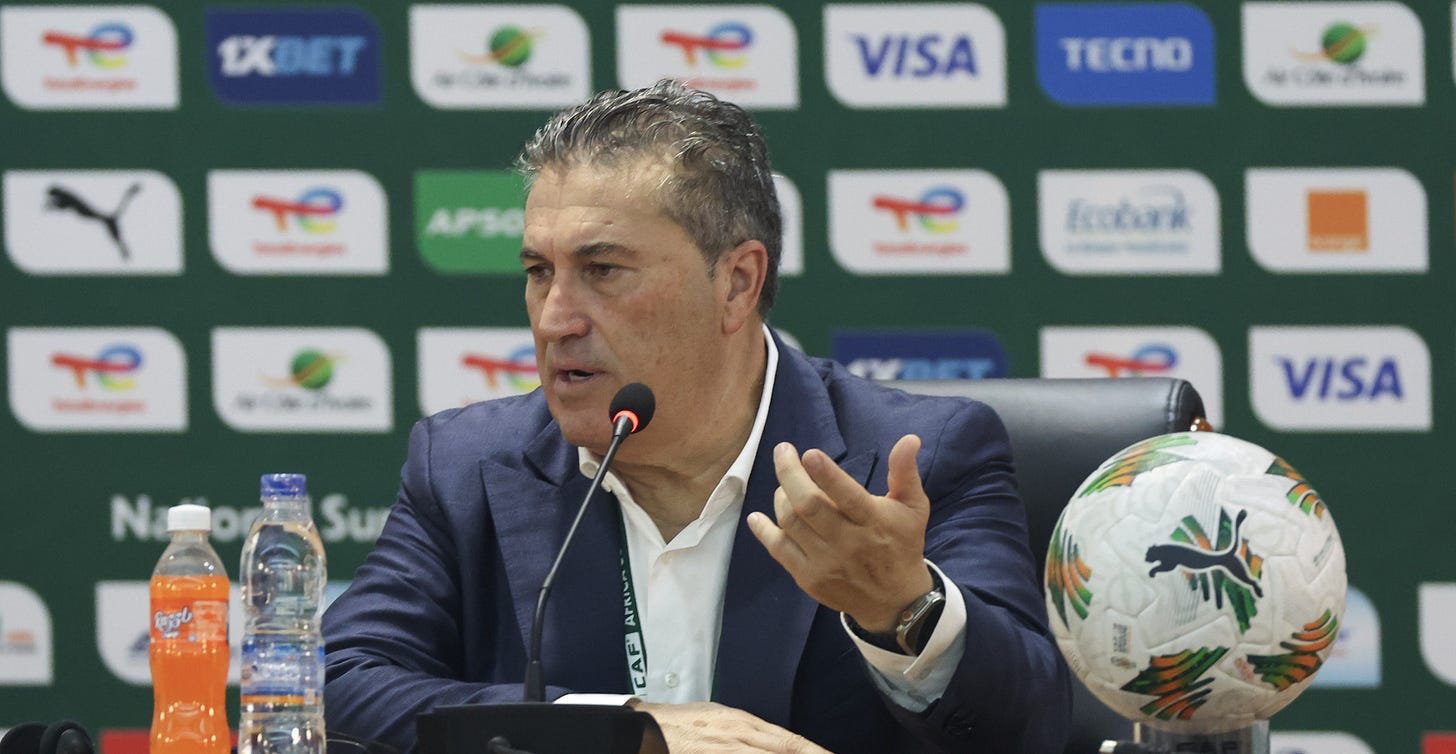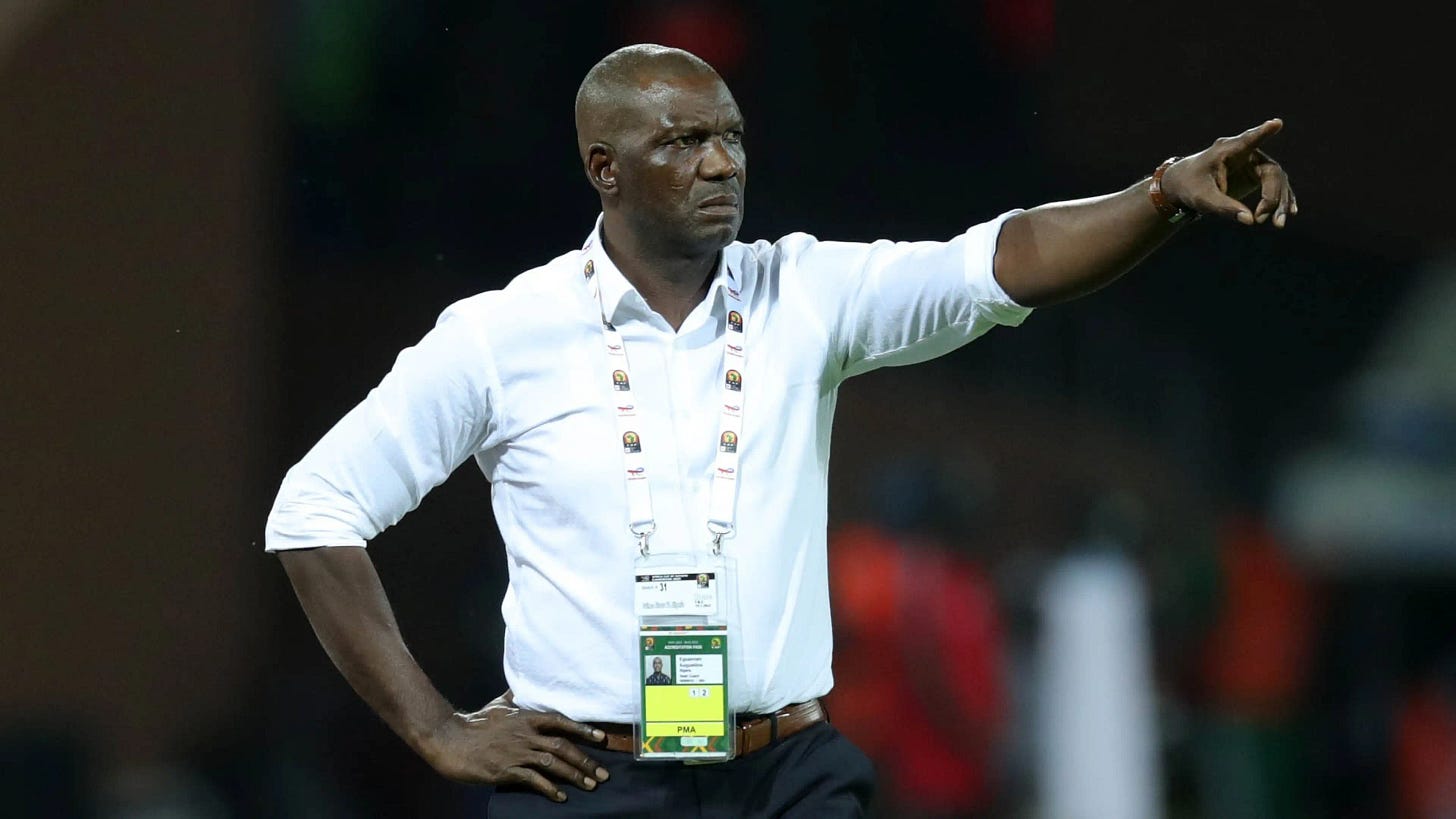Context: Jose Peseiro
One week ago, Nigeria came as close as is humanly possible to winning a fourth Africa Cup of Nations (AFCON).
The Super Eagles ultimately fell short, undone by a flick of Sebastien Haller’s boot inside the final 10 minutes. It was a proper kick in the teeth but, considering expectations were far from lofty going in, a silver medal finish is worthy of credit. Save for a subsection of vocal idiots on social media, the output and sacrifice of the players has earned serious acclaim from the public as well. It ended in disappointment, but the tournament did wonders when it came to healing the rift that had threatened to open up between the national team and its fanbase.
Jose Peseiro has also seen his image significantly rehabilitated: whereas, going in, most thought of the Portuguese coach as a charlatan, his perceived tactical acumen appears to have won many over to his side.
Context is everything, however, and the appraisal of Peseiro’s work demands nuance, and this is irrespective of what happens from here. Whether he is renewed (he is currently out of contract) or leaves, it is necessary to properly contextualise his work in Côte d’Ivoire.
In late 2021, amid all of the confusion that followed the decision by the Nigeria Football Federation (NFF) to sack Gernot Rohr barely a month to AFCON 2021, the proposition initially put forward was for Peseiro to take charge of the team immediately (i.e. right at the end of December).
This was later amended, presumably at the Portuguese’s request, to the 63-year-old playing an observer role during the tournament, before taking over fully afterward.
This would eventually take place, albeit after Augustine Eguavoen had been handed – and duly botched – the responsibility for the two-legged 2022 World Cup play-off against Ghana after the AFCON.
In an alternate reality where Peseiro had, in fact, knuckled down to the challenge immediately, the performance his side served up in Cote d’Ivoire this past month would, ironically enough, have been apt in Cameroon: lacking the time and the familiarity with the squad to lay down anything overly elaborate, it would have made sense to prioritise defensive solidity and a vanilla attacking strategy.
To put it simply, what we witnessed over the last month was the decision-making protocol of an interim manager, a last-minute hire parachuted in to conduct a salvage operation. (If that seems harsh on account of the aforementioned modest expectations pre-tournament, it is worth remembering/realising that his sub-par work was a major part of the reason the prognosis was grim to begin with.)
This really is the crux of the matter. The reason it makes no sense to appraise Peseiro's long-term viability using the AFCON is precisely because the abrupt, drastic nature of his change of emphasis discourages anyone from doing so. It demands viewing in a vacuum.
There is no universe in which a second-place finish can be considered a failure. However, there is one in which the approach by which it was arrived at can be: essentially, by leaning on such a rudimentary style, Peseiro admitted that the previous 18 months of his employment had been a complete waste of time and (theoretical) resources.
The entire point of opting against bringing him straight into the thick of things on the eve of the 2021 edition was that the NFF, put simply, wanted a sense of continuity from the Rohr era. This informed the decision to hand Eguavoen – who had been cosplaying as the Technical Director and so was, in theory at least, a part of the setup already – the reins. For all the talk about “tournament football”, tournaments are part of a continuum. Or, at least, they should be.
Since actually stepping into the role in May 2022, Peseiro has made no secret of his preference for a two-striker system and a back four. While it was widely derided as being poorly structured, and failed to properly convince aside from two lopsided beatings of Sao Tome and Principe, the former Sporting boss persisted with it until the opening match of AFCON 2023. Only then did he proceed to tinker, beginning the draw against Equatorial Guinea, and then settling on the 3-4-3 with which the Super Eagles reached the final.
In the process, he ran his preferred starting lineup into the ground. When Nigeria did arrive at the final against the host nation, they were so addled, so beset upon by sheer exhaustion, that they seemed a shell of their usual selves, even within their standard defensive outlook. This outcome will have come as no surprise to anyone paying attention through the tournament, though, as the fatigue was the culmination of two factors, both of them related to Peseiro’s late tactical volte-face.
The first was that, simply by virtue of how little time the team had to learn the system, it was necessary for them to fill in the gaps with an excess of rigour. Drilling a new shape and approach takes time to perfect – to get the distances right, to clearly define responsibilities and recognise moments for switching, to identify pressing triggers, etc. Without these principles ingrained, more reactive jumps are required, and so more energy is expended putting out fires than proactively forestalling them.
The Super Eagles’ surfeit of physical exertion was necessary because the system had not been drilled properly in a number of phases. (Witness, for instance, how much of their sporadic high pressure actions were individually motivated – Victor Osimhen and Frank Onyeka, in particular – and not backed up by a second wave.)
Remember this first factor. We will return to it down the line.
The second is that Peseiro’s squad management and approach to rotation was that of a man who stumbled upon a solution, and so was reluctant to tinker with it in any way for fear of upsetting the delicate “balance”. The upshot was a complete denudation of players’ physical conditioning as the tournament progressed.
Not even taking a more charitable view of the 63-year-old’s decision-making in this respect (i.e. assuming ) flatters him. William Troost-Ekong, per credible reports, played through injury almost all tournament; Osimhen had abdominal discomfort for at least the last two matches, and was buffeted mercilessly all tournament; Moses Simon had his elbow strapped during the knockout stages; Ademola Lookman had an ankle sprain ahead of the final; Zaidu Sanusi not only came into the tournament off the back of a long-term injury absence, but missed two separate matches with injury during.
To have a squad of players with roughly similar levels of ability, bar a few obvious standouts, and to still have so many playing through the pain barrier right until the end was – if we are not to assume incompetence – borderline negligent, and suggests Peseiro was in it purely for his own glorification, with the welfare of the players given short shrift. (In that sense, he is a lot like his friend, namesake and colleague Jose Mourinho who has, at times in the past, questioned players’ commitment to the cause on account of their unwillingness to take painkilling injections.)
Taken together, we have a portrait: a self-serving and/or incompetent coach who lucked onto or synthesised an actionable system (a complete departure from his usual one) and selection at the last minute, and then proceeded to beat it like a rented mule until it was splayed out in the dirt, to the end that Nigeria procured a silver medal.
Said coach is now out of contract, and a choice presents itself to the NFF. It may not entirely be in their hands anyway, as Peseiro is reportedly courting interest from Algeria, most notably, but assume for a second that he remains in the role going forward. What happens then?
If he sticks with the approach that got the Super Eagles to the final in Côte d’Ivoire, failure in World Cup qualifying is a distinct possibility. In a 10-match round robin league format, the onus is squarely on winning matches, as opposed to not losing them. Nigeria opened their campaign with consecutive draws against Lesotho and Zimbabwe, two of the three weakest teams in the group per the FIFA ranking, and are already two points off the pace set by Rwanda. While South Africa and Benin are, by no means, pushovers, it stands to reason that they will challenge the Super Eagles to break them down, denying them space in behind to break into.
If, however, Peseiro decides, having dispensed with the tournament, that a reversion to the previous system and approach is necessary, even that comes with no guarantees. Despite that seeming to be his philosophical preference from the outset, at no point in the prior has the former Venezuela boss been able to actually make his 4-2-4 work coherently, despite having over a year and half with which to work.
What, then, is there to look forward to? Neither sticking nor twisting offers a satisfactory guarantee, and that simply buttresses the sense that, for all that a second-place finish is impressive in isolation, it has not, in fact, given this team anything concrete to properly build upon.
This is the main case against the idea of Peseiro, and offers a holistic lens through which the events of Cote d’Ivoire should be viewed. It was simultaneously an impressive outcome on the whole and an unacceptable (strain of) performance for a coach in a non-interim capacity, given what had gone before.



Since 2022, I have always stuck with the opinion that Jose Peseiro does not have what it takes to build a strong team and deliver proper results with the great quality of players currently at the disposal of the national team. #PeseiroOut